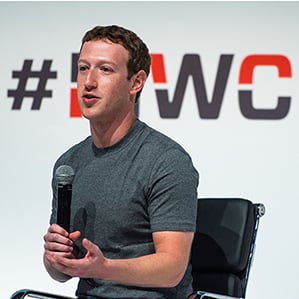Zuckerberg: Internet Growth Means More than Drones
Mark Zuckerberg said today at Mobile World Congress in Barcelona, Spain, that Internet.org, Facebook’s effort to subsidize Internet access in the developing world, has brought new people online and helped telecommunications operators pick up new data subscribers around the world. “It works,” Zuckerberg said.

Zuckerberg cautioned people not to focus too much on Facebook’s plan to deliver Internet connectivity via drones. Although that aspect has attracted a lot of attention, he said, the technology is “actually at the fringe of what we’re working on,” since most people live within range of more conventional infrastructure.
Other speakers discussed the challenges involved in widening the Internet’s reach. Copper wires laid by big companies have carried communications for over a century, yet less than 40 percent of the world’s population has Internet access, the global consulting firm McKinsey estimated late last year.
Many believe that getting the Internet to the other 60 percent will require new approaches. A Google executive at Mobile World Congress, for example, said that the company continues to experiment with both drones and balloons to provide signals to remote locations (see “Breakthrough Technologies 2015: Project Loon”).
Despite such efforts, cost remains a big barrier for many people who remain offline. Kartik Sheth, CEO for data and devices at Bharti Airtel, an Indian telecommunications company, said during a seminar on digital inclusion that Internet usage rates in some of his markets are only half of smartphone ownership rates. He said local phone salesmen advise some users not to activate data to avoid high data charges.
There is also a big difference in Internet access by gender across the world. An Intel study published in 2013 estimated that 25 percent fewer women than men in the developing world use the Internet. “There’s a fear of allowing women to gain mobile phones because of the independence it might give them,” said Cherie Blair, founder and director of the Cherie Blair Foundation, which promotes female entrepreneurship, at the same seminar. Blair is the wife of the ex-U.K. prime minister Tony Blair.
Christopher Burns, acting director for digital development at the U.S. Agency for International Development (USAID) in Washington, D.C., said telecom operators have “targeted all the young males in urban communities, and now as they pivot more to rural, remote communities, their strategies have to shift.”
USAID has been supporting organizations that develop content relevant to local populations, Burns said. That is more or less Internet.org’s strategy: provide some teaser content that will persuade people to pay for access to the wider Internet. But there is a key difference: with Internet.org, the content that users can access for free is determined by Facebook and its telecom partners (see “Facebook’s Two Faces”).
Some are suspicious of the social implications of a walled-garden version of the Internet with content curated by telecom operators and a social network. “I am actually incredibly afraid of what happens if Internet.org succeeds,” says Mark Surman, executive director of the Mozilla Foundation. “We need to be behind the Internet as an open marketplace for ideas.”
Keep Reading
Most Popular
Large language models can do jaw-dropping things. But nobody knows exactly why.
And that's a problem. Figuring it out is one of the biggest scientific puzzles of our time and a crucial step towards controlling more powerful future models.
How scientists traced a mysterious covid case back to six toilets
When wastewater surveillance turns into a hunt for a single infected individual, the ethics get tricky.
The problem with plug-in hybrids? Their drivers.
Plug-in hybrids are often sold as a transition to EVs, but new data from Europe shows we’re still underestimating the emissions they produce.
Stay connected
Get the latest updates from
MIT Technology Review
Discover special offers, top stories, upcoming events, and more.